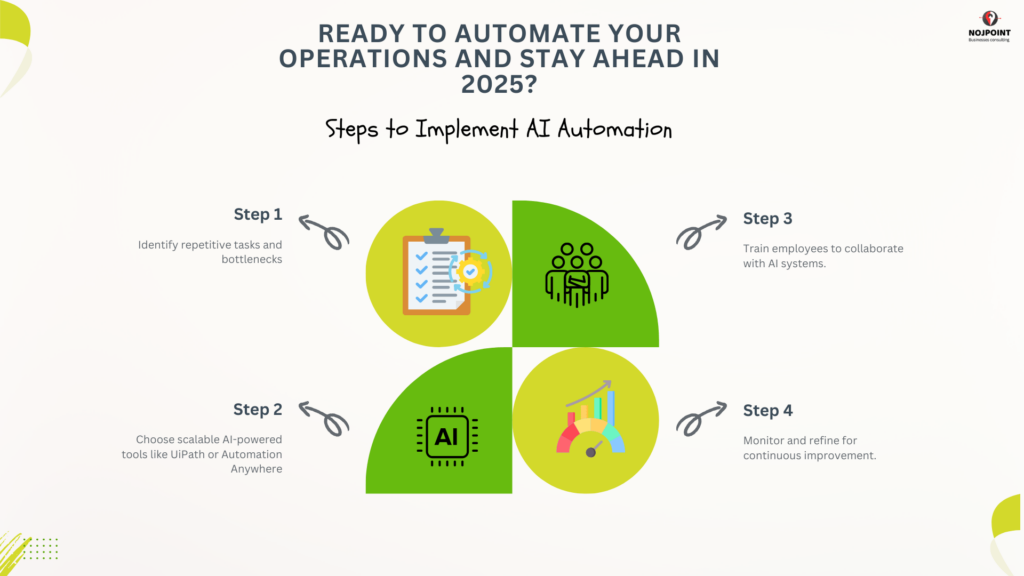In today’s fast-paced business world, staying competitive requires embracing innovative technologies. Among these, artificial intelligence (AI) and machine learning (ML) have emerged as game-changers for process automation. By streamlining workflows, reducing manual effort, and delivering data-driven insights, AI and ML are helping businesses achieve unprecedented levels of efficiency and scalability. This guide delves into how these technologies are revolutionizing operations and driving transformation across industries.

Understanding Process Automation
What is Process Automation?
Process automation involves using technology to execute repetitive tasks and workflows with minimal human intervention. By automating processes, businesses can improve efficiency, reduce errors, and free up valuable resources for more strategic activities.
The Role of AI & Machine Learning in Automation
AI and ML take automation to the next level by enabling systems to learn from data, adapt to new information, and make intelligent decisions. This evolution allows for more complex, context-aware automation compared to traditional rule-based systems.
The Benefits of AI-Powered Process Automation
Enhanced Efficiency and Productivity
- Automating repetitive tasks reduces human effort and increases output.
- ML algorithms continuously improve workflows, optimizing resource allocation.
Cost Reduction
- By minimizing manual errors and improving precision, businesses can save significant operational costs.
- AI reduces the need for large human teams to handle routine tasks.
Improved Decision-Making
- AI-powered tools analyze vast amounts of data to generate actionable insights.
- Predictive analytics assist in making informed business decisions quickly.
Scalability and Flexibility
- AI systems can handle increasing workloads without compromising performance.
- They adapt seamlessly to changing business requirements.
Key Applications of AI and ML in Business Operations
Customer Service Automation
- Chatbots and Virtual Assistants: AI-powered bots handle customer inquiries efficiently, offering 24/7 support.
- Sentiment Analysis: ML algorithms analyze customer feedback to improve services.
Supply Chain Management
- Inventory Optimization: AI predicts demand and manages stock levels effectively.
- Real-Time Tracking: ML integrates IoT for real-time monitoring of shipments.
Finance and Accounting
- Automated Invoice Processing: AI processes and categorizes invoices accurately.
- Fraud Detection: ML identifies anomalies and flags suspicious activities.
Marketing and Sales
- Personalized Campaigns: AI analyzes user behavior to deliver tailored content.
- Lead Scoring: ML prioritizes leads based on their likelihood to convert.
HR and Recruitment
- Resume Screening: AI filters resumes to find the most qualified candidates.
- Employee Retention: ML predicts attrition rates and suggests retention strategies.
Implementing AI and ML for Process Automation
Identify Areas for Automation
- Conduct a workflow audit to pinpoint repetitive and time-consuming tasks.
- Prioritize processes that significantly impact productivity and cost-efficiency.
Choose the Right Tools
- Research and invest in AI-powered platforms like UiPath, Blue Prism, or Automation Anywhere.
- Evaluate tools based on scalability, ease of integration, and customization.
Train Your Team
- Upskill employees to work alongside AI systems effectively.
- Provide training on data analysis, machine learning, and automation tools.
Monitor and Optimize
- Continuously analyze the performance of automated systems.
- Use feedback to refine algorithms and improve outcomes.
Overcoming Challenges in AI and ML Adoption
Resistance to Change
- Foster a culture of innovation by educating teams about the benefits of automation.
- Highlight success stories to build confidence in AI-powered systems.
Data Privacy and Security
- Implement robust data protection protocols to address privacy concerns.
- Use encryption and access controls to secure sensitive information.
High Initial Costs
- Start small with pilot projects to demonstrate ROI.
- Leverage cloud-based AI tools to reduce upfront investment.
The Future of AI-Driven Process Automation
Emerging Trends
- Hyperautomation: Combining AI, RPA, and advanced analytics for end-to-end automation.
- Cognitive Automation: AI systems that mimic human thought processes.
- Edge AI: Processing data locally for faster decision-making in IoT devices.
Industry-Specific Innovations
- AI in healthcare for automating patient scheduling and diagnosis.
- ML in retail for dynamic pricing and inventory prediction.
- Automation in manufacturing for predictive maintenance and quality control.
Conclusion
AI and machine learning are not just tools; they are catalysts for transformation. By embracing AI-powered process automation, businesses can achieve greater efficiency, reduce costs, and drive innovation. Whether you’re a startup or an established enterprise, integrating AI and ML into your operations is essential to staying competitive in 2025 and beyond.
Ready to transform your business operations with AI and machine learning? Contact NOJPoint for expert guidance and tailored solutions!
